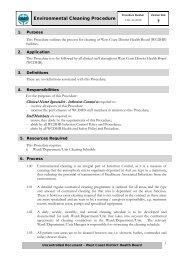Connections pamphlet - West Coast District Health Board
Connections pamphlet - West Coast District Health Board
Connections pamphlet - West Coast District Health Board
You also want an ePaper? Increase the reach of your titles
YUMPU automatically turns print PDFs into web optimized ePapers that Google loves.
Who is it for<br />
Who is it fo r:<br />
What’s the programme<br />
Week 1<br />
Introductions — Who is Here<br />
Things to know…<br />
if some one in your family has a mental illness<br />
Young people who have a parent with<br />
mental health problems such as<br />
depression, schizophrenia, bi polar<br />
disorder.<br />
What is it for<br />
Age range between 10-14/15<br />
Meeting other people of a similar<br />
age living in a similar situation in a<br />
confidential and safe way. You are<br />
not alone.<br />
Learning about mental illness and<br />
some strategies for coping with it<br />
when some one you live with has it<br />
Having fun<br />
When and where<br />
Greymouth CAMHS, Cnr Cowper<br />
St & Morice St Greymouth<br />
August 6th<br />
Week 2<br />
August<br />
13th<br />
Week 3<br />
August<br />
20th<br />
Purpose for the Meeting<br />
What does support mean for you<br />
What is Mental Illness anyway<br />
What questions do you have for the next few<br />
weeks<br />
How can I cope with this : Tips to help you get by<br />
Identifying feelings and what to do about them<br />
Stress Management<br />
Personal Strengths<br />
Forging a resilient path<br />
Communication<br />
Setting Goals<br />
Managing changes<br />
Solving problems<br />
It’s not your fault — You can’t cause some one’s<br />
mental illness. Mental Illness affects the way people<br />
think, their feelings and emotions and the way they<br />
deal with other people. There are things you can do to<br />
make it a little easier to live with.<br />
Take care of yourself – do things you like doing—<br />
sports, hobbies, crafts. Living with someone who has a<br />
mental illness can be very stressful. Make sure you<br />
take the time to do things you enjoy doing.<br />
Your feelings are OK—It is Okay to feel sad, angry,<br />
alone, confused, scared. Other people feel that way<br />
too. Talk to someone you trust— It’s is Ok to talk about<br />
how you feel with someone you trust—family member,<br />
teacher, school counsellor, mental health worker, child<br />
& adult resource worker.<br />
It can get better.— often with medication and with<br />
support from mental health services, people with a<br />
mental illness can get better and live a normal life.<br />
(Big, grey square building near<br />
the hospital bridge)<br />
How much does it cost<br />
Nothing but your time for a few weeks.<br />
Week 4<br />
August<br />
27th<br />
What else do I need to know<br />
Resources, systems information—who is that<br />
anyway and who else can help me.<br />
Finale—what else do I need, who can I stay in<br />
contact with.<br />
It’s no joke. It isn’t something people ask to have or<br />
like to have. People with mental illness are not<br />
psycho, schizo, lunies, crazies or nutters. It is<br />
important to find out as much as you can about<br />
mental illness through your library, mental health<br />
service or the internet. If you have questions, ask the<br />
mental health professionals.


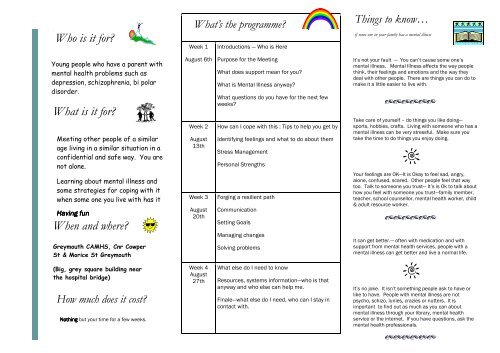

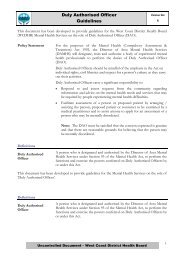
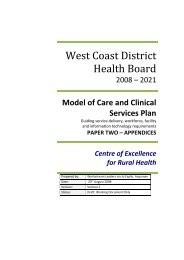
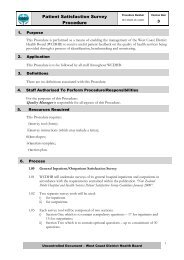
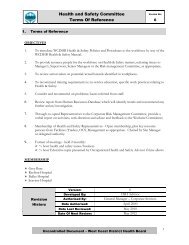
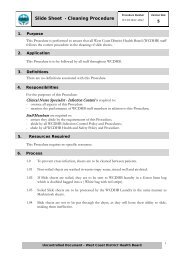

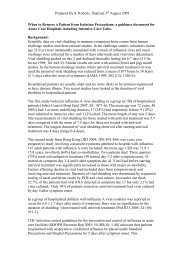
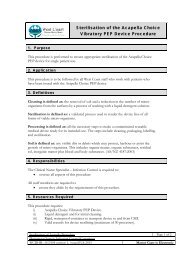

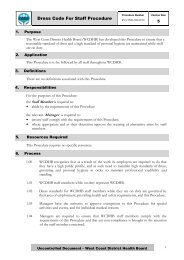
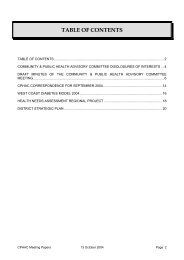
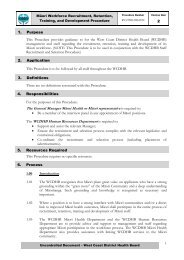
![Precept Procedure [PDF, 81 KB] - West Coast District Health Board](https://img.yumpu.com/42915337/1/184x260/precept-procedure-pdf-81-kb-west-coast-district-health-board.jpg?quality=85)
